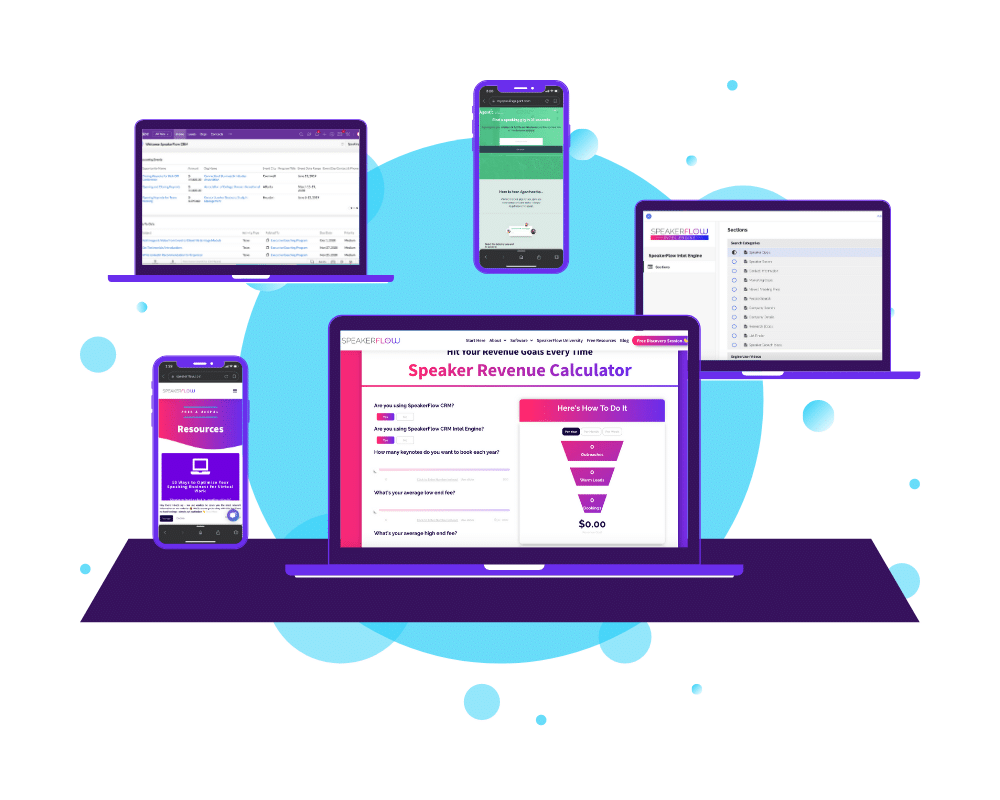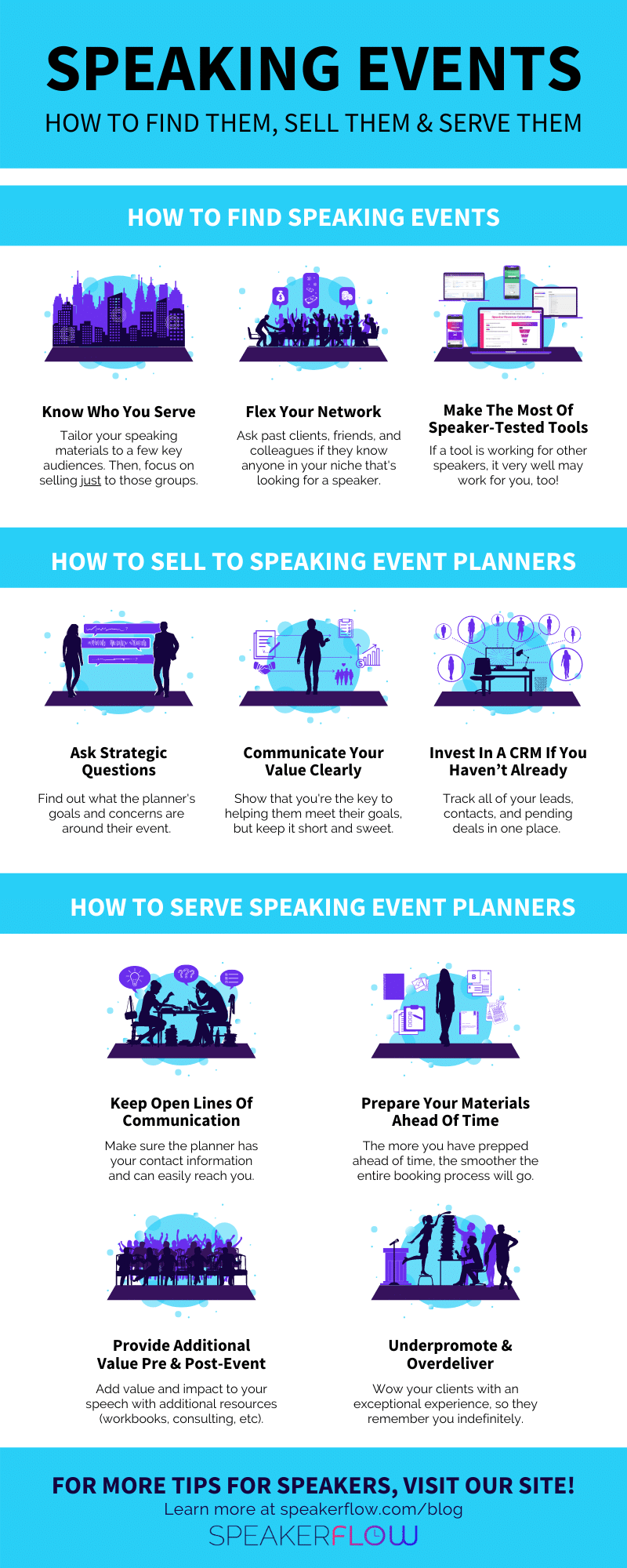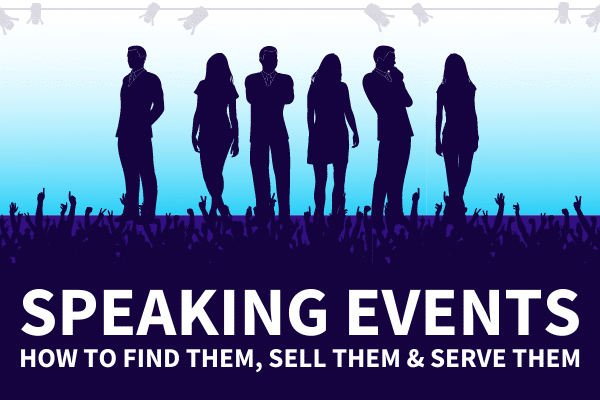In one way or another, the speaking industry has been around for thousands of years. Whether you’re studying the record of a neanderthal village or the philosophers of ancient Greece, public speaking is readily apparent, as every community needs guidance and thought leadership in order to grow. Today, that need is greater than ever as the world population grows and the average human life operates more and more frequently in a virtual space (social media, remote work, etc). Along with this increase in demand, however, it’s also become slightly more difficult to find speaking events. After all, you’re no longer just competing with speakers in your area. You now have solid opportunities to speak around the world, making the competition all the steeper.
That said, like sales in any industry, finding speaking events – and selling to their organizers – is simply another skill to master. To help with that, in this guide, we’ll cover the three broadest segments of speaker sales: finding gigs, booking them, and making sure your client is so pleased that they can’t help but come back to you for their next event. As always, we’ll also share any and all of our resources surrounding these “segments.” That way, you can jump into your sales efforts with a proven process in mind. 👍
So, without further ado, let’s get started!
How To Find Speaking Events
The first component of the speaker sales process is finding speaking events that fit your expertise and fee range. For years, one of the most common sources of leads for speakers was lead lists, including those from AssociationExecs.com, D&B Hoovers, and SalesGenie. However, in each of these cases, these lists are widely accessible and relatively inexpensive, making them widely used and the contacts in them harder to reach. Additionally, in many cases, the contacts in each list haven’t been recently updated and, as a result, aren’t truly a good fit for your speaking business.
Because of these “cons,” we recommend taking a more thorough approach to finding speaking events. While lead lists may be quick to access and easy to contact, taking extra time to find leads one at a time generally results in more qualified prospects, more background details about each prospect, and more sales closed in the long run. In other words, finding a lead at a time might be a little extra work upfront but the return on investment (in terms of both money and time) is massive.
Know Who You Serve (And Stick To That Industry)

Before looking for leads, you first have to narrow your focus. For many speakers, it’s tempting to go after every opportunity across a wide variety of industries. If you’re a customer service speaker, for example, you might think, “Well, everyone exercises customer service to some extent. My material applies to everyone!” Other common examples include speaking businesses focused on change management, human resources, or leadership. However, this strategy is kind of like trying to build an entire house at once. If you start building the frame and, at the same time, try to pour the foundation and start painting, the quality of each of those tasks will suffer. Instead of taking one job at a time, you’re trying to do too much at once!
To avoid this, start with an industry or two and stick to speaking events within that arena. If you talk about customer service, consider focusing on software as a service (SAAS) companies. If you’re a leadership speaker, try reaching out to military or medical organizations, where being a calm and decisive leader is part of the job. Your goal should be to find the industries that can benefit most from what you have to say, and build your reputation in those industries until you have a steady stream of referrals in that industry and your thought leadership is well known among other industry leaders. Then, after you’ve mastered that industry, test out opportunities in other industries that could use your help. At the very least, you’ll have the original industry to rely on as you continue branching out.
Plus, your clients aren’t just hiring you for your presentations. They’re also hiring you because of you, as an individual. What better way to build that personal relationship than giving them (and their industry) your full attention?
Flex Your Network
Next, after narrowing down your focus industry, start building your network within that industry. If you already have connections, ask if they know of anyone currently hiring for an event. Alternatively, ask if they know any event organizers or meeting planners and if they could introduce you. In the best-case scenario, you make new connections and start building new relationships (for upcoming or future speaking events). In the worst-case scenario, you get “no” for an answer and you’re no worse off than you were before asking. Either way, it’s at least worth a LinkedIn message, email, or phone call to catch up with your existing connections and maintain your ties with them.

Conversely, if you’re new to the industry entirely, build a map of different ways to connect with your audience. Then, build that map into a plan for this month, this quarter, even this year so it’s segmented into easy-to-accomplish pieces. That way, over the course of a year or so, you can take your reputation from “nobody” to “noteworthy” without burning out.
Below are a few network-building strategies to inspire your planning process:
- Look for guest blog or podcasting opportunities. The more you can appear as an expert in other industry leader’s content, the more people will know your name (and want to hire you).
- Work your LinkedIn network. Sometimes, all it takes is a quick message, an offer of a virtual coffee, and a half-hour conversation for you to kickstart a lasting relationship with an event organizer or company decision-maker.
- Make referrals part of your sales process. When an event is over, it should be standard procedure to ask your client for a referral. That way, you build your network and your client passes on the value to their friend. It’s a win for everyone involved!
Make The Most Of Speaker-Tested Tools
The third and last way to find speaking events is simply to trust recommendations from other speakers. Nowadays, finding leads doesn’t necessarily require manual searching for events or the dreaded lead lists we covered initially. In fact, thanks to the insights and feedback of thousands of speakers, there are a handful of speaker-specific tools available to make the gig-finding process as quick and easy as possible, so you can spend less time searching for opportunities and more time closing them.

One of these tools, for example, is the Speaker Intel Engine. Created by speaker and sales guru Sam Richter, the Intel Engine is essentially a Google search overlay. This means that an Intel Engine search gives you access to 100% of Google’s results, compared to the 4% offered in a standard Google search. It’s also specifically tailored to the speaking industry, so you can run a wide range of searches from a single tool. Looking for speaking gigs? Check. And event organizer contact information? Check. What about those podcasting or guest blog opportunities we mentioned above? Check and check! In short, if you want to find highly accurate information specific to the speaking industry, this is the place to go.
Additionally, the Intel Engine is just one of the professional speaker-tested and approved tools on the market. Although it’s arguably the best bang for your buck, there are tons of others to test out for yourself, too. Just ask other speakers in your network for their “speaking event finder” recommendations. Who knows? Maybe a game-changing tool is just a question or a click away! 🎉
How To Sell To Speaking Event Planners
Moving on, the second segment of the speaker sales process is the most important: the sale. Compared to other industries, sales within the speaking industry can be a challenge. Every keynote or presentation often comes with a big price tag, and it can be difficult to build up the confidence to say, “Yes, a few hours of my time is worth $20,000, and here is why.” Take it from our team, with a collective 20+ years of experience in the industry. We feel your pain!
Nevertheless, getting booked for speaking events on a consistent basis simply takes practice. There are also a handful of things you can to make every “sales” exchange feel like less of a pitch and more of a conversation, so you’re more comfortable selling and your potential client feels more comfortable signing your contract. In the following sections, we’ll cover three of these strategies. That way, you can begin reinforcing that “service before sales” mentality in yourself and your team and start closing more deals as a result.
Ask Strategic Questions
The first component of a solid sales conversation is actually a few components, namely strategic questions for your potential client. With any client – new or old – there are going to be goals, problems, and requests that you can’t anticipate without asking about them outright. Maybe they’re bringing in a new CEO and looking to rally the team. Maybe their sales were impacted by the 2020 COVID-19 pandemic, and they’re still trying to recover. Whatever the problem and/or goal, your questions should encourage your potential client to discuss them. This not only builds trust between the two of you. It also gives you a wealth of information to use when you argue how and why you can help them tackle those issues.

But, before we cover how to build off of their answers, it’s critical that you plan your questions so you’re prepared well ahead of time. Below are a few tried-and-true favorites from some of our own speaker clients.
- What led you to host the event, and what do you hope attendees will gain from it?
- Which “kind” of talk would be the most relevant for your audience (practical, comedic, etc.)?
- What is the audience generally like (age, seniority, etc.), and what are they most happy or stressed about at this time?
- Who are the other speakers, and what will they talk about?
- What are your thoughts on additional connection with the audience after the event (workbooks, consulting, coursework, etc)?
In the long run, this list is merely a starting point for your speaking business. As you work through more and more conversations and speaking events, create your own list of questions that have helped you gain useful information. Then, tweak that list consistently until you have a set of questions that works every time.
Communicate Your Value Clearly & Concisely
Once you’ve asked your questions, it’s time for the pitch. This part of the conversation is all about providing value in a timely manner so that you are not only respectful of your potential client’s schedule but also free to handle multiple of these conversations in a single day. To keep the meeting moving forward, the classic Five Steps to a Conversation is a reliable rule of thumb. Although they weren’t originally tailored to speakers, these steps have been a sales staple for decades, and are a solid starting point as you gain confidence in your selling ability and learn the strategies that work for your speaking business.

Below are the professional speaker’s version of the “Five Steps.”
- Start with introductions. Plain and simple.
- Learn their story. In the original “Five Steps to a Conversation,” you only share your story, but in this case, focusing on their story (and asking your list of questions) is a better move.
- Present your offerings clearly and quickly. If you’re unsure how to explain your value in a concise way, start by creating a value proposition and promise statement.
- Close the conversation. If you’re a good fit for their speaking events, explain how you can be of immediate and future assistance.
- Outline next steps. Ideally, both of you should leave with a clear idea of what to expect from each other and how the relationship will move forward. (In the traditional “Five Steps,” this step focuses on upselling, but that doesn’t always apply at this point in the speaker sales process.)
All in all, these steps are simply a baseline for your sales conversation. As you close more contracts, make adjustments based on your results or client feedback until, like your list of questions, your conversation outline works time after time.
Invest In A CRM If You Haven’t Already
After the “money conversation” is over, the next step to flawlessly getting booked for speaking events is organization. Although one conversation and one potential client is easy enough to remember, after a while, contacts and speaking events will inevitably pile up. Next thing you know, you’re asking, “What was the name of the woman I spoke to last Friday?” and “Was I supposed to call her this morning?” From that point, it’s only a matter of time before opportunities start falling through the cracks, and your seemingly solid speaking income starts to dry up.

Thankfully, that’s exactly what CRMs are for! These platforms, also known as “customer relationship management” tools, are designed to help you keep track of every client, partner, company, and opportunity in your business. Among speakers, this is especially important because of the size of each sale and the high likelihood of referrals from each event. In short, any business without a CRM is probably losing money, but speaking businesses without CRMs are definitely losing money.
As far as speaker CRMs go, there are two main options built specifically for speakers: karmaSpeaker and SpeakerFlow CRM. The former, karmaSpeaker, is relatively minimal and best suited to speakers looking for a simplistic and elemental option for their speaking business. The latter, SpeakerFlow CRM, is more dynamic and comes with more than 40 additional applications designed to grow with your speaking business and stay effortlessly organized, no matter how busy you are. That said, your choice of CRM doesn’t matter nearly as much as using one in the first place. For more information to help you choose a CRM (or switch to a better one for your speaking business), check out our beginner’s guide to CRMs. 👍
How To Serve Speaking Event Planners
Last but not least, after you’ve been hired, all that’s left to do is make sure your speaking events run as smoothly and efficiently as possible. To do this, it’s undeniably important to practice your speech material repeatedly leading up to the event date. However, it’s also critical to provide an exceptional experience for your clients during and after each event, too. That way, they know that you see them as a long term partner rather than a sales number.
Additionally, while exceptional service is a sure way to close a sale in the first place, it’s also an easy way to turn that sale into more opportunities in the future. Essentially, your goal should be to provide such an amazing experience for your clients that when they are next asked, “Who should I hire for my event?” by a friend or colleague, their first answer will be you. Over time, those references will add up and you’ll be getting referred throughout your focus industry like we covered in the first section. See? We’ve come full circle!
So, what are the key ways to provide an exceptional experience for speaking event planners, you ask? Let’s talk about that.
Keep Open Lines Of Communication
First up, throughout your speaking events, make sure you are easy to reach. Even an experienced event organizer is sure to run into questions, concerns, or requests specific to their current event. Because of this, they typically have a lot on their plate, and being unable to reach the person they just hired is a form of stress they absolutely do not need. Remember, even though you’re benefiting from their event, your main goal is to support them. Your presentation, your AV or travel requirements, your emails and calls – everything should revolve around the following question: Does this action make my client’s experience better?

Besides being quick to respond to emails or calls, communication with event organizers also includes updating them before the event. When your plane lands, leading up to a live event, let them know. When you arrive at the event venue and run your AV check, tell them. Even if it means arriving to the event – in a live or virtual setting – earlier than you planned, they should know either (a) everything is going according to plan or (b) you’ve hit a roadblock and need their help. In either case, keeping the lines of communication open will make the situation easier for both of you.
It also goes without saying that being easy to work with also makes you a desirable hire for additional opportunities to work together. After the event is over, for example, you could offer copies of your book, group coaching, or other add-ons that not only add value for your client but also justify a higher price for your speaking package. Being communicative and helpful for your client makes this additional purchase all the more likely.
Prepare Your Materials Ahead Of Time
In addition to open communication, another component of an exceptional speaking business is preparation. Besides client information, your speaking collateral should also be stored securely and regularly updated. Whether it’s something small (like your logo or a headshot) or something more elaborate (like your speaker kit), you should be able to receive a request for information from an event organizer, make any custom changes, and send it to them in less than 24 hours. For incoming leads especially, being able to respond quickly doesn’t just show that you have your sh*t together. It also builds on their existing interest, as 78% of customers purchase from the company – or, in this case, speaker – that responds to their request first.

On a daily basis, this won’t always be possible. Nevertheless, it’s a good thing to keep in mind, especially if the person reaching out to you is a new client. It’s also a tried-and-true way to show existing connections that you value your relationship. After all, in your own correspondence, do you feel prioritized when you receive a reply in an hour or three days later? Within an hour, right? The same is true from your clients’ and potential clients’ seats, too.
With this in mind, although the exact list will vary depending on your focus industry and the speaking events in question, there are a few standard things to have on hand in your cloud file storage, listed below.
- Your speaker kit
- Short, 100-word, and full versions of your speaker biography
- Photos of you speaking and posing for headshots
- Descriptions of your speaking programs
- Your list of audio/visual (AV) requirements
- Written or video testimonials from previous clients
Provide Additional Value Before, During & After The Event
As mentioned previously, another trademark of exceptional speaker service is providing value before, during, and after the event itself. Before speaking events, part of this value comes from communication and preparedness, as we already covered. However, it can also come in the form of add-on services, such as videos for their social channels or pre-event surveys to gain more information about your audience. Depending on the client and their specific event, there are countless ways to create custom promotional content and/or boost audience engagement before the event even starts.

Likewise, mid- and post-event, your presentation isn’t the only way to provide additional value for your client and their audience. For example, for a single keynote, you might provide a companion workbook. For an all-day event, you might offer to mix and mingle with the audience so they get to know you a bit and, consequently, pay more attention during your speech. You can also use your talents outside of speaking to make your appearance more memorable, including things like artwork or a group photo as a “thank you” for your participation in the event. Then, after the event is over, you have the chance to turn your one-time appearance into an ongoing contract. We touched before on executive consulting or team coaching, for example, but, whatever you offer should extend the impact of their event and be conducted with the same exceptional service.
These are just a few of the ways you can boost the value of your presence at speaking events. For more ideas, check out the list of bonus ways to add value in our Sales Script Guide.
Underpromote & Overdeliver

Last but not least – and above all else in this guide – always overdeliver for your clients. As with any purchase, organizers for speaking events always enter a conversation with expectations, especially if they’ve worked with a long list of speakers before you. Your goal is to exceed those expectations in every step of the process. When you send an email, be exceptionally friendly and quick to respond. When you arrive on the day of the event, be exceptionally punctual and easy to work with. Then, after the event is over, be exceptionally generous and supportive with extra ways to add value or continue your relationship. By the end of the speaker sales process, you want every client to be looking for ways to continue working with you simply because they like you so much!
That isn’t to say that this is the only way to stand out as a speaker. Obviously, you can be exceptionally loud or flamboyant or funny, too. However, each of these things along with everything about your brand can be copied. The only thing that can’t is the extent to which you’ve mastered each step of the sales process, from finding event organizers to serving them so well that it’s impossible for them to forget you.
Hopefully, this semi-short guide gave you a solid start point for finding, booking, and dominating speaking events. For more information, check out our ultimate guide to sales in the speaking industry.
For insights specific to virtual speaking, see our guides to finding virtual gigs and being an exceptional virtual speaker. 👍







